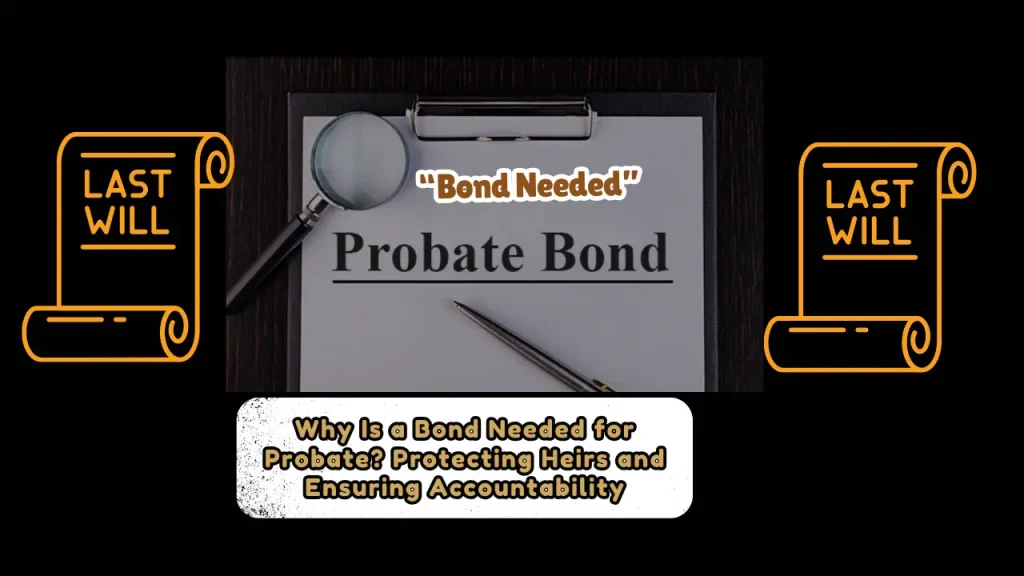Why Is a Bond Needed for Probate? Protecting Heirs and Ensuring Accountability
A probate bond is an important protection when someone passes away, and their estate (money, property, and belongings) needs to be handled. Many people wonder why it is required. This article explains what a probate bond is, why it is needed, and how it helps protect heirs and creditors.
Table of Contents
What Is a Probate Bond?
A probate bond (also called a fiduciary bond) is a type of insurance that ensures the person in charge of handling an estate (the executor or administrator) does their job honestly and correctly. If they make mistakes, steal, or mismanage the estate, the bond provides financial protection for the heirs and creditors.
Key Features of a Probate Bond:
- Protection: Covers losses caused by mistakes or fraud.
- Cost: Usually 1–3% of the estate’s value, paid from estate funds.
- Purpose: Ensures the executor follows the law and the will’s instructions.
Why Is a Probate Bond Necessary?
Handling an estate means managing money, property, and debts. Sometimes, executors make mistakes or act unfairly. A bond helps protect the heirs from issues such as:
- Negligence:
- Failing to pay taxes or debts on time.
- Selling property for less than it’s worth.
- Misconduct:
- Stealing estate funds.
- Favoring one heir over others.
- Errors:
- Distributing assets incorrectly.
- Forgetting to pay creditors.
Without a bond, heirs would need to file a lawsuit to get compensation, which can be expensive and take years. A bond allows heirs to recover money quickly.
Example:
If an executor mismanages a $500,000 estate and loses $250,000, a probate bond allows heirs to file a claim to recover the lost money.
When Is a Probate Bond Required?
Not all estates need a bond. Whether it’s required depends on:
- The Will:
- If the will says the executor doesn’t need a bond, it may not be required.
- Heir Agreement:
- If all heirs agree, they can sign a Waiver of Bond to remove the requirement.
- State Laws:
- Some states require a bond, especially if there is no will or the estate is large.
Examples of State Rules:
- Texas: Most independent executors don’t need a bond.
- Florida: A bond is required unless all heirs agree to waive it.
- California: Small estates (under $184,500) don’t need a bond.
Related article for you:
What Does “Without Bond” Mean in Probate? Rules, Risks & Key Considerations

Who Pays for the Bond, and How Much Does It Cost?
- The estate (not the executor personally) pays for the bond.
- The cost is usually 1–3% of the estate’s total value.
- The bond amount is often equal to the total estate value plus expected income.
Cost Factors:
- Estate size (larger estates require higher bonds).
- Executor’s credit history (poor credit means higher costs).
- State rules and regulations.
How Probate Bonds Work?
- Executor Applies: They provide personal and estate details to a surety company.
- Bond Issued: The surety sets terms and charges a premium.
- Claims Process: If the executor causes financial loss, heirs file a claim to get reimbursed.
Risks of Skipping the Bond
If a bond is skipped when it’s needed, heirs could face:
- Financial Loss: If the executor mishandles the estate, heirs might not get their rightful inheritance.
- Lawsuits: Heirs would need to sue the executor to recover money.
- Court Delays: Judges may delay the probate process if bond requirements aren’t met.
How to Avoid a Probate Bond
If you want to avoid the need for a probate bond:
- Include a Waiver in the Will: The deceased can state that no bond is required.
- Get All Heirs to Agree: If everyone signs a Waiver of Bond, the court may not require one.
- Use Simplified Probate: Some small estates qualify for a quicker process without a bond.
Key Takeaways
- A probate bond protects heirs and creditors from executor mistakes or fraud.
- The cost depends on the estate’s value, executor’s credit score, and state laws.
- A bond is often required unless the will or heirs waive it.
- Skipping a bond can lead to financial loss and legal troubles.
Need Help?
- Find a Surety Provider: SuretyBonds.com
- Free Legal Templates: LegalZoom
- Talk to a Probate Attorney: They can help with state-specific rules.
Final Thoughts
A probate bond may seem like an extra step, but it protects heirs and ensures that estates are handled correctly. If you’re dealing with probate, make sure to understand your state’s rules and consult a professional to avoid unnecessary costs and delays.
About the Author

Sarah Klein, JD, is an experienced estate planning attorney who has helped clients with wills, trusts, powers of attorney, and probate matters. At All About Lawyer, she simplifies complex estate laws so families can protect their assets, plan ahead, and avoid legal headaches during life’s most sensitive moments.
Read more about Sarah

Excellent explanation of why probate bonds are required. One detail that often comes up in practice is that while the executor applies for the bond, the premium is typically reimbursed from the estate. For those seeking a state-by-state overview of probate court bond requirements, https://www.ProbateCourtBond.com/court
provides a helpful directory.